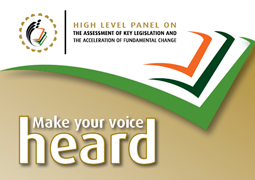
Parliament should consider enacting legislation that will enhance the regulation of the liquor industry and strengthen the national substance abuse intervention programme, the High Level Panel (HLP) assessing the impact of laws passed since 1994, was told during public hearings in North West on Thursday.
Mr Collen Rapula Mpyana from a non-governmental organisation fighting substance and drug abuse told the Panel at the Rustenburg Civic Centre that young people were the most vulnerable to the problem of drug and alcohol abuse facing South Africa, and proposed legislative intervention.
“Drug abuse is a serious problem in our society, young people are most vulnerable, alcohol is also easily available, and our law-makers must intervene. We cannot allow the liquor industry to self-regulate,” Mr Mpyana said.
Speaking on the second day of the two-day public hearings by the Panel, Mr Mpyana also called for the enactment of the South African Youth Council Act which he said would make the council “a watchdog on issues of implementation” of youth empowerment policies.
“The National Youth Development Agency (NYDA) Act makes an assumption that the agency can solve all challenges facing young people, and that’s a fallacy. It is a non-empowering legislation and there is a need for the SA Youth Council Act to be a watchdog on issues of implementation. We also need to strengthen our national substance abuse intervention programmes,” he told the Panel.
Mr David Romohale called for the reversal of the 60/40 provision made by the Traditional Leadership Framework and the Traditional and Khoisan Leadership Bill. Under this provision, traditional leaders are entitled to elect 60% of members of the traditional councils and the remaining 40% is elected by the community.
“If the chiefs have a majority in the traditional councils it means they can enter into deals (with mining companies doing business on communal land) without the involvement of the community, it was mentioned here by other speakers that there is no chief that has got land, it was bought by members of the community and the 60/40 provision must be reversed to give the community a majority.
He also called for Traditional Courts Bill to be put on hold until the Traditional and Khoisan Leadership Bill has been promulgated, so that the Khoisan can also be part of the Traditional Courts Bill process following the intended recognition of their traditional leaders and inclusion in the House of Traditional Leaders.
“Why don’t we put the Traditional Courts Bill in abeyance and deal with the Traditional and Khoisan Leadership Bill until promulgation? He asked.
Mr Ramohale also labelled the Mineral and Petroleum Resources Development Act (MPRDA) as a “pain in the flesh”. “Why am I saying this, the captains of the industry are the chief executive officers who are looting our minerals in the form of open cast mining and leaving open dongas, contaminating our water and air, while contributing nothing in the development of the local communities where they mine,” he said.
“We propose the following amendments to the MPRDA: prospecting fees must be paid to the communities that own the land; applicant must disclose the environmental report yearly; and the community that owns the land must be represented in the boards of directors of the mining companies,” he told the Panel.
The High Level Panel was appointed by the Speakers’ Forum to assess the impact of all laws passed by the democratic Parliament since 1994, and has visited eight provinces since the beginning of its work last year. The only province still to get an opportunity to interact with the Panel is Limpopo, which will be visited later this month (March).
The Speakers’ Forum is an organisation comprising the Speakers and Deputy Speakers of all nine legislatures and the National Assembly as well as the Chairperson and Deputy Chairperson of the National Council of Provinces (NCOP).
“The Legacy Report of the 4th Parliament, (2009-2014) identified the assessment of the impact of legislation as one of the key tasks of the 5th Parliament. Our task is to look into the extent of implementation of legislation, quality as well as the impact of legislation on the lives of the people,” said Panel Chairperson, former President Kgalema Motlanthe.
He said the mandate of the Panel is to assess the impact of legislation in four broad areas which are: (a) the triple challenges of poverty, unemployment and inequality; (b) creation of equitable distribution of wealth; (c) the land question (land reform and restitution) as well as (d) nation-building and social cohesion.
“”We want to hear from South Africans how their lives have been impacted upon by legislation passed by our Parliament, whether these laws have been good or complicated,” he said.
North West Provincial Legislature Speaker, Ms Rebecca Dantjie, said: “This process seeks to assist the government and Parliament, if there is any law that does not speak to improving the lives of the citizens, it should be amended or even repealed if needs be.”
Representing the Nama community, Ms Ella Bitjies, called for legislation that will give Nama and Khoisan communities recognition and the inclusion of their languages in the schools’ curriculums.
“We, the Nama people, still have the problem of being accepted by broader society. None of the government’s programmes provides for the preservation or promotion of our heritage. Let us be given the pride in our culture, let us have representation, and a curriculum developed for the Nama language. Let us get equal treatment before the law regardless of being a minority,” she said.
Former President Motlanthe said: “Your inputs and complaints have been noted, and the North West Provincial Government will act on those issues that can be attended to before the Panel reports back to the Speakers’ Forum by August this year.”
By Sakhile Mokoena
2 March 2017

